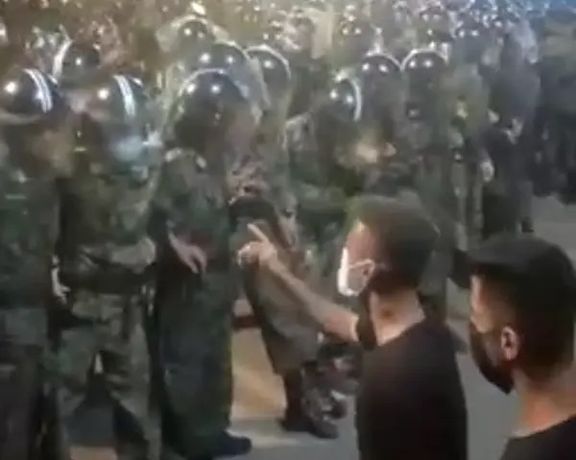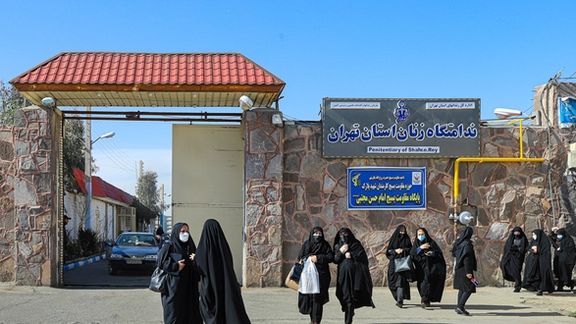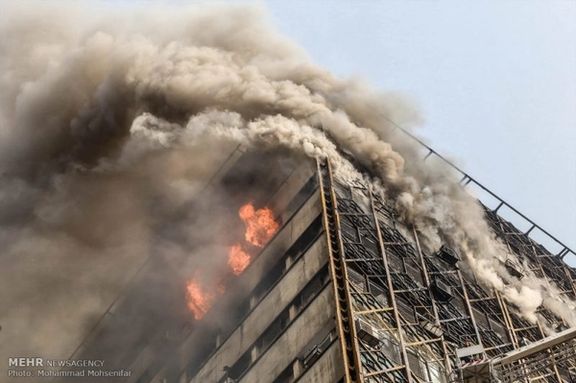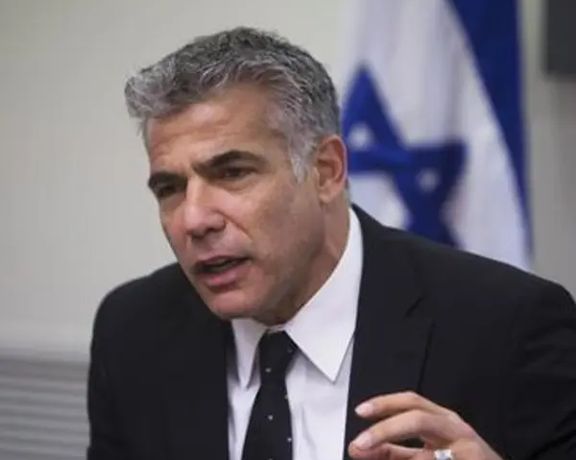Actors, Filmmakers Pressured Not To Support Iran Protests

Security forces in Iran have increased pressure on Iranian filmmakers who issued a statement in support of popular protests urging security forces to exercise restraint.

Security forces in Iran have increased pressure on Iranian filmmakers who issued a statement in support of popular protests urging security forces to exercise restraint.
Iranian filmmaker Mohammad Rasoulof said on Tuesday that the signatories of the statement – headlined ‘Lay Down Your Arms’ -- have been threatened and intimidated by the Islamic Republic authorities to rescind their signatures.
"They think cinema is their barracks where they can use militarism to silence the artists' protest against violence,” he said.
In their open letter published on Sunday, a large group of film makers and actors called on security forces responsible for suppressing protests to lay down their weapons. Citizens have been demonstrating since last week against the rulers of the clerical regime.
Without directly mentioning the statement, the Iranian Minister of Culture and Islamic Guidance warned Monday night, “We will punish those who seek to stand in the way of IRGC and guardians of Iran’s security by releasing worthless statements and delusional remarks.”
In reaction to the letter, Cinema Press website, with links to the security apparatus, quoted an “informed source” as saying that anyone who incites armed forces to rebel, flee, or surrender will face from six months to 10 years of prison.
The ongoing protests began when a 10-story building collapsed in Abadan, in the oil-rich Khuzestan province May 23, leaving 36 people dead while dozens are still missing.

The attorney of several jailed Iranian activists, says the lives of political prisoners in Qarchak women's prison are in danger, implying that the authorities are using other prisoners to threaten them.
In an interview published on Tuesday, Mostafa Nili said a message received from his client, civil and human rights defender Narges Mohammadi, and photojournalist Alieh Motalebzadeh said their lives are danger by one of the prisoners who is charged with murder and threatening to kill them to become famous.
Pointing out that the prisoner had no "previous problems or conflicts" with Mohammadi and Motalebzadeh, he said that such threats without any history of disputes or conflicts seemed "suspicious".
Nili also said that following the death threat, several inmates with a history of violent crimes tried to provoke clashes twice with the prisoners of the political ward during visits to the prison infirmary.
He added that the issue began with the threats to Mohammadi and Motalebzadeh, but since Sunday other political prisoners have also been threatened. Nili noted that prison authorities have not taken any action.
He said that such incidents are reminiscent of similar clashes between criminal prisoners and political detainees in recent years, such as the cases for Golrokh Ebrahimi Iraee, Atena Daemi, Shakila Monfared, and Saba Kord Afshari who were beaten in apparent clashes with other inmates.
In 2019, political prisoner Alireza Shir-Mohammad-Ali was killed in Tehran’s Fashafoyeh Prison after he was stabbed in the neck and stomach by two inmates of the general ward.
Earlier in the year, Reporters Without Borders expressed concern for the lives of jailed activists who have been transferred to detention centers known to mistreat prisoners, including Qarchak women’s prison.

Following the release of a list of 129 unsafe buildings in Tehran, the former head of the City Council of the capital said Monday security authorities had been against the publication of the list in the past.
In an interview with Ensaf News on Monday, Mohsen Hashemi Rafsanjani said that the list had been available since at least 2020 but security authorities pushed to bury the list of high-risk buildings in Tehran. Ensaf News last week published the list, citing the fire department.
Ghodratollah Mohammadi, the new head of Tehran Fire Department, who said on Sunday that "we will definitely publish the list of 129 high-risk buildings in Tehran with the coordination of the prosecutor's office," rejected the validity of the list on Monday. "It is invalid and has nothing to do with the Tehran fire department," he said.
He had said on Sunday that there are more than three thousand cases of such buildings in the capital.
The issue of unsafe buildings has become hot as protests began last Monday, when a 10-story building collapsed in Abadan, leaving 34 people dead and an equal number missing. It quickly became apparent that the owner was a powerful and well-connected businessman who had disregarded regulations and building codes, being backed by officials, who might have had their own financial interests.
Anti-government protests continue in Iran’s oil-rich Khuzestan province as large number of security forces have been mobilized to crack down.

US Secretary of State Antony Blinken Monday condemned the "unjustified seizure" of two Greek-flagged vessels by Iran's Revolutionary Guard last week, the State Department said.
Iranian forces seized two Greek tankers in the Gulf on Friday, shortly after Tehran warned it would take punitive action against Athens over the confiscation of Iranian oil by the United States from a tanker held off the Greek coast.
"Iran's continued harassment of vessels and interference with navigational rights and freedoms are a threat to maritime security and the global economy," Blinken said in the statement.
Blinken made the comments in a telephone call with Greek Foreign Minister Nikos Dendias, the department said.
The US and Greek diplomats called on Iran to immediately release the seized vessels, their cargoes, and their crews. Blinken said the United States stands with its NATO ally "in the face of this unjustified seizure."
Iran's state maritime body said on Saturday the crew of the two Greek tankers not been detained, and were in good health and being cared for onboard their vessels.
Greek authorities last month impounded the Iranian-flagged Pegas off Greece due to European Union sanctions. The United States later confiscated the Iranian oil cargo held onboard, Reuters reported on Thursday.
The Pegas and its Russian crew were later released, but the seizure inflamed tensions amid stalled nuclear talks between Iran and the West.

Iran’s rial hit a low point against major currencies Monday, as nuclear talks with the United States remain in limbo, prices rise and popular protests continue.
The rial has been sliding since mid-March when year-long multi-lateral talks in Vienna to revive the 2015 nuclear agreement known as JCPOA came to an abrupt halt. Washington and Tehran apparently were too far apart on some issues, including Iran’s demand that its Revolutionary Guard should be removed from the US list of terrorist organizations.
The rial slid to 310,000 to the US dollar on Monday, while in 2017, before the Trump administration decided to withdraw from the JCPOA it traded at 34,000 to the US dollar, ninefold decline. This was the currency’s lowest point so far in 2022.
The continuing decline of the currency is bad news for the rulers of the Islamic Republic as they already face runaway inflation at above 40 percent. Every percentage point the rial loses in value it translates into higher food prices, because at least half of Iran’s wheat and a large amount of animal feed is imported.
The government’s decision in early May to stop multi-billion-dollar subsidies for food impots resulted in a price shock for ordinary people, with experts predicting even higher inflation.
A report in the Iranian media on Monday said that even bottled drinking water is too expensive for people living on ordinary salaries.
The Statistical Center of Iran (SCI) just last week released its report on prices for the 30-day period of April 21-May 20.
Prices for pasta, which has become a relatively cheap source of calories for wage earners, jumped by 49 percent in one month, and cooking oil by 22.3 percent.
When it comes to chicken, eggs and other food items, what people and media report is astonishing. Chicken prices have doubled in recent weeks and sales declined by 30 percent. The government was forced to lift export restrictions to help producers stay financially solvent, but most have cut back on production, reportedly killing and dumping newly hatched chicks.
SCI reports that price of lemons has risen 11 percent and watermelon by 12.8 percent in one month.
As the government lifted food import subsidies, protests began in dozens of small towns, as large cities, notably the capital Tehran remained mostly quiet. But on May 22, an unexpected disaster sparked new protests.
A 10-story building in the south-Western city of Abadan in the oil-rich |Khuzestan province collapsed, killing more than 30 people and leaving an equal number under the debris. Quickly it became apparent that the newly built building was mired in corruption, as repeated warnings by inspectors were ignored by its well-connected owner. He even received permission to add a few floors to the building.
Iranians on social media often talk of a crisis of legitimacy for the Islamic Republic. Many people have lost all confidence that the authorities can govern even at a minimally acceptable standard.
This, than any particular incident or inflation is the deep rooted cause of protests. A building collapse, such as the incident in Abadan, simply comes to remind citizens that the authoritarian system is corrupt at all levels, and there is no hope for any tangible improvement.
A former deputy minister and political activist Mostafa Tajzadeh tweeted Monday that the government claims to be able to circumvent US sanctions and export oil, yet there is no positive impact on the economy and people continue to suffer.

Israeli Foreign Minister Yair Lapid said Monday that Iran must understand that it will pay the price for its terrorist activities and threatening Israelis around the globe.
“The problem with Iran is that it is the number one terrorist propagandist in the world because both Hezbollah and the Islamic Jihad are under its responsibility and threaten Israelis all over the world,” Lapid told Israel’s Army Radio.
Israel's National Security Council also warned its citizens against travel to Turkey Monday, citing Iranian threats of revenge for the assassination last week of Revolutionary Guard colonel Hassan Sayyad-Khodaei.
Tehran has blamed Israel and vowed revenge for the killing of an officer of IRGC’ Quds Force -- responsible for operations outside Iran’s borders -- who was shot dead at the wheel of his car by two people on a motorcycle.
Earlier on Monday, Hossein Salami, the commander of Iran’s Revolutionary Guard, alleged that Israel was behind the assassination, vowing avenge for the assassination.
Iran’s Fars news agency affiliated with the IRGC published an article on Sunday profiling several Israeli businesspeople and implicitly threatening them and their families.
Lapid also said Israel is coordinating with the United States and Persian Gulf States to normalize its relations with Saudi Arabia, adding, “We believe that it is possible to have a normalization process with Saudi Arabia. It’s in our interest.”
Jerusalem and Riyadh have no official diplomatic ties, but relations have warmed in recent years, apparently against Iranian influence in the region.
On Thursday, the head of Knesset’s Foreign Affairs and Defense Committee Ram Ben Barak denied the country took responsibility for Sunday’s killing, following a leak to The New York Times about the assassination.